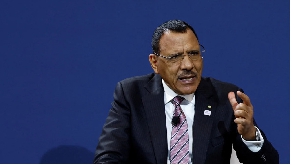 Niger's ousted President Mohamed Bazoum
Niger's ousted President Mohamed Bazoum
Mohamed Bazoum, the democratically elected president of Niger, said he is being kept isolated and forced to eat dry rice and pasta by the military junta who overthrew him and are refusing to cede power despite international pressure.
In a series of text messages to a friend, Bazoum said he has been “deprived of all human contact” since Friday, with no one supplying him food or medicine.
Bazoum’s messages were given to CNN with the ousted president’s consent.
Bazoum said he has been living without electricity for a week, as have many Nigeriens. Nigeria supplies much of neighboring Niger’s electricity but cut off the power in response to the coup.
All of the perishable food he was supplied with has since gone bad, and he is now eating dry pasta and rice.
Despite his isolation, Bazoum has been in contact with the outside world. Though denied the chance to speak with acting US Deputy Secretary of State Victoria Nuland during her visit to Niamey, the Nigerien capital, on Monday, Bazoum spoke by phone with her boss – Secretary of State Antony Blinken – a day later, the State Department said.
Ouhoumoudou Mahamadou, the prime minister in Bazoum’s government, told French TV that the president was in good spirits despite being held in a “catastrophic situation.”
Hopes for a diplomatic resolution to the political conflict, however, have begun to fade.
Nuland’s meeting Monday with senior coup leaders lasted more two hours, consisting of “extremely frank and at times quite difficult” conversations. A Tuesday face-to-face meeting that was supposed to take place in Niamey between the junta and representatives from the United Nations, the Economic Community of West African States (ECOWAS) was canceled at short notice.
Junta leaders said in a letter that postponement of the meeting was “necessary” in “this atmosphere of threatened aggression against Niger.”
However, Mahamadou, Bazoum’s prime minister, told French state-funded broadcaster TV5-Monde that the junta would like to continue dialogue with ECOWAS, the bloc that has been leading the regional response to the political crisis in Niger.
ECOWAS leaders are due to meet on Thursday in Nigeria to discuss the coup, though specifics regarding the gathering remain unclear.
The regional bloc had given the junta one week to return to their barracks and reinstall Bazoum, but that deadline came and went on Sunday without any change.
ECOWAS has maintained that its preference is to find a diplomatic solution to the standoff, but has not ruled out using force to restore constitutional order and bring Bazoum’s government back to power.
On Monday, the Nigerien military brought troop reinforcements into the capital to prepare for a potential foreign intervention and reassure nervous residents, some of whom have either fled the city or began stocking up on necessities.
The junta may now face more organized internal resistance to its rule as well. Rhissa Ag Boula, a minister in Bazoum’s government and former rebel leader, announced the formation of an anti-junta resistance group that will “work to reestablish order” in Niger.
The group, Resistance Council for the Republic (CRR), urged the military to stand down and arrest the junta’s apparent leader, Abdourahamane Tiani, in a statement. The council also warned that “that it will use all necessary means to eliminate this perfidious practice of questioning people’s choices by rogue and irresponsible soldiers.”
Ag Boula’s movement could draw support among the Tuaregs, an ethnic minority in Niger. He led several Tuareg rebel factions in the 1990s and 2000s in fights against the central government before being integrated into the political process by Bazoum’s predecessor.

Protesters hold a Niger flag during a demonstration on independence day in Niamey on Thursday